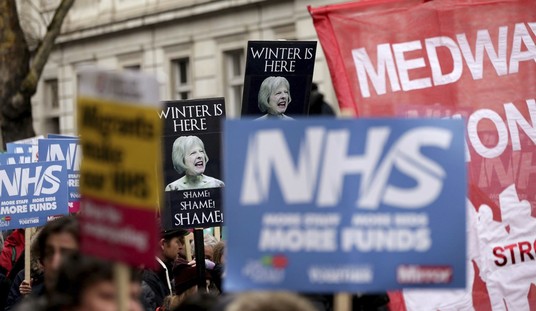Given the uncertainty surrounding the presidential debate tonight, I wasn’t sure exactly what to expect. Both Barack Obama and John McCain have had to fly more than they expected in the last couple of days, and neither got a chance to focus on preparation, at least not to the extent they planned. I figured we’d see at least one major gaffe or breakdown from one of the candidates, and honestly, I wasn’t looking forward to seeing it.
However, I think both men did better than I expected. Neither seemed to show any effects from the hectic pace of the past week, and both appeared ready and relaxed at the start of tonight’s debate. I’d also include Jim Lehrer in that description, even though he had to rewrite part of his script to accommodate the economic crisis. Lehrer gave the debate a light touch as moderator, allowing the candidates plenty of space to talk and encouraging dialogue rather than speechmaking. It was perhaps one of the best presidential debates I’ve seen in this cycle, maybe the best.
With that said, McCain clearly got the best of Obama tonight. After a shaky couple of minutes to start the first question, McCain jabbed at Obama all night long — and he got Obama obviously flustered. While McCain kept his equanimity and never raised his tone or pitch, Obama got visibly upset, his voice pitched higher when responding to McCain, and Obama interrupted more. Obama also kept calling McCain “John” while McCain used the more proper “Senator Obama”, a difference that grated as the evening wore on.
Substantially, McCain also bested Obama on both economics and foreign policy. On the former, it was most apparent when Lehrer asked both candidates what they would cut as President after the bailout package passes. Obama could not bring himself to commit to one single cut, and instead talked about all of the funding he wanted to create for pet programs. McCain noted that he has long championed spending reductions and proposed a spending freeze on all but the most vital programs. When challenged on this point, Obama refused to say whether he would accept a freeze.
I did have a moment of frustration with McCain on the first question, a round I think Obama won. He never challenged Obama’s assumptions that the current credit crisis came from too little regulation. I kept expecting McCain to talk about the disaster of the Community Reinvestment Act, and the mandates from Congress that Fannie Mae and Freddie Mac encourage bad lending by buying up bad paper. Instead, he tried to out-populist Obama, and Obama sounds more authentic as a populist.
On foreign policy, Obama did better than expected, but still fell short. I think his response on the decision to go into Iraq was quite good (even if I disagree with it), but he kept trying to argue that he didn’t demand a precipitous withdrawal in 2007 when the record clearly shows he did — and he beat Hillary to death with it in the primaries. McCain drew blood when he pointed out that for all of Obama’s talk about the priority of Afghanistan, he never once bothered to visit that front until last July, even though his Senate subcommittee has jurisdiction on NATO issues. Obama spluttered in response but never did explain why such an important theater wasn’t worth a single visit from him.
On Georgia, Russia, and eastern Europe, McCain proved himself the master of detailed foreign-policy thinking. While Obama talked briefly about the potential for NATO membership for Georgia and Ukraine and pledged to “rebuild Georgia’s economy”, McCain explained the geopolitical realities of the entire region, and Russia’s intentions for it.
If Obama expected the old man to be too tired to debate properly, he is surely disappointed tonight. McCain kept Obama on defense all night long, made Obama lose his composure, and maintained his own in a very presidential performance. This one is a clear win for McCain.
Update: Obama tried to twist out of the “no preconditions” statement by claiming that Henry Kissinger supported it. McCain openly scoffed at the notion, and for good reason — Kissinger didn’t say it:
Henry Kissinger believes Barack Obama misstated his views on diplomacy with US adversaries and is not happy about being mischaracterized. He says: “Senator McCain is right. I would not recommend the next President of the United States engage in talks with Iran at the Presidential level. My views on this issue are entirely compatible with the views of my friend Senator John McCain. We do not agree on everything, but we do agree that any negotiations with Iran must be geared to reality.”
Either Obama lied, or he’s too inexperienced to understand what Kissinger said and actually meant.
One more point about Obama’s obfuscations about “preparations” as opposed to “preconditions”: he originally said that he would meet with Ahmadinejad, Castro, Kim, and Chavez in his first year in office:
QUESTION: In 1982, Anwar Sadat traveled to Israel, a trip that resulted in a peace agreement that has lasted ever since.
In the spirit of that type of bold leadership, would you be willing to meet separately, without precondition, during the first year of your administration, in Washington or anywhere else, with the leaders of Iran, Syria, Venezuela, Cuba and North Korea, in order to bridge the gap that divides our countries?
COOPER: I should also point out that Stephen is in the crowd tonight.
Senator Obama?
OBAMA: I would. And the reason is this, that the notion that somehow not talking to countries is punishment to them — which has been the guiding diplomatic principle of this administration — is ridiculous.
How much “preparation” time would he have?








Join the conversation as a VIP Member